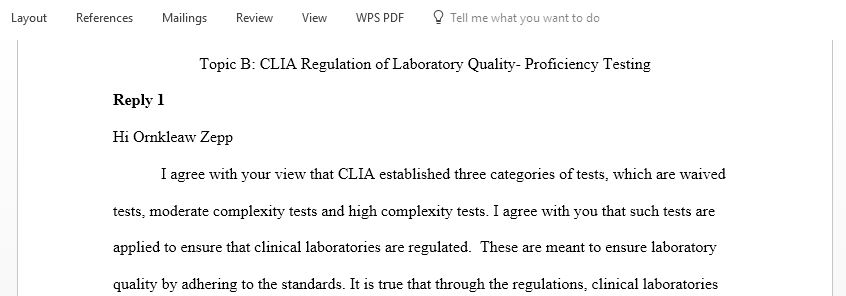Replies to CLIA Regulation of Laboratory Quality
Topic B: CLIA Regulation of Laboratory Quality
Unlike pharmaceuticals or IVDs, Laboratory Developed Tests or home brew tests which are offered within a single clinical laboratory, are not required to demonstrate their “safety” or their “effectiveness” for regulatory purposes. CLIA legislation focuses instead on assuring laboratory quality. Explain one of the ways a laboratory demonstrates that it is delivering a quality service to the medical community or to consumers? Do you think this focus on overall quality assurance is the right regulatory approach? Why? Explain your reasoning.
TOPIC B: CLIA REGULATION OF LABORATORY QUALITY- PROFICIENCY TESTING
The Clinical Laboratory Improvement Amendments Act of 1988(CLIA) is administered by the Centers for Medicare & Medicaid Services (CMS). CLIA established three categories of tests including waived tests, moderate complexity tests, and high complexity tests to ensure the clinical laboratories are under pertinent regulations. CLIA regulations requires laboratories to establish and manage quality standards. For instance, in the pre-analytical phase, laboratories must establish a system for proper sample accessioning and handling, in the analytical phase, laboratories must meet performance specifications; accuracy, precision, analytical sensitivity and analytical specificity, in post-analytical phase, laboratories must ensure test results are sent to the test requestor accurately and reliably (The CLIA framework, n.d.). All CLIA certified laboratories must enroll in a proficiency testing program. A proficiency testing program is for verifying the accuracy of test and procedures. All involved lab technicians are required to biannually perform the same procedure on the unknown samples that were sent from the approved PT program. Then report the results back. The lab’s approved PT program will grade the results and send feedback. In terms of a quality service, the proficiency testing can demonstrate the lab personal able to perform the test accurately. In my opinion, performing the proficiency testing is necessary requirement for CLIA labs.
Regrading Laboratory Developed Tests (LDTs), Congress authorized FDA to regulate IVDs as devices but not LDTs in 1976 because at that time, LDTs were for simple tests and were locally utilized. However, currently many of them are high complexity novel tests such as genetic disordered disease or cancer diagnostic tests such as liquid biopsy test for personalized medicine (Personalized medicine coalition, n.d.). CLIA regulations which focuses on analytic validity of individual tests might not be enough. Clinical utility is also essential aspect to be considered for patient’s optimal outcomes. Therefore, the FDA announced its intent to reconsider its policy of enforcement discretion for LDTs in 2010 (FDA, 2018) because of LDTs have significantly evolved to more complex testing.
In my opinion, LDTs are essential in terms of rapid innovative diagnostic testing although if LDTs do not satisfactorily demonstrate the utility validity, that could cause difficulty in marketing the tests themselves. For example, an effective test that is approved by the FDA will be easier for the clinical adoption and reimbursement.
References:
FDA, (2018). Laboratory developed tests. Retrieved from https://www.fda.gov/medical-devices/vitro-diagnostics/laboratory-developed-tests (Links to an external site.)
FDA, (2018) Remarks at the American Clinical Laboratory Association annual meeting.
Personalized medicine coalition, (n.d.). Pathways for oversight of diagnostics. Retrieved from BMD667, module2 learning material.
The CLIA framework, (n.d.). BMD667. Retrieved on August 30, 2020. From BMD667, Module2 learning material.
Answer preview for Replies to CLIA Regulation of Laboratory Quality
Access the full answer containing 535 words by clicking the below purchase button

